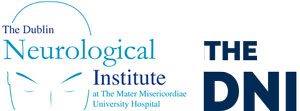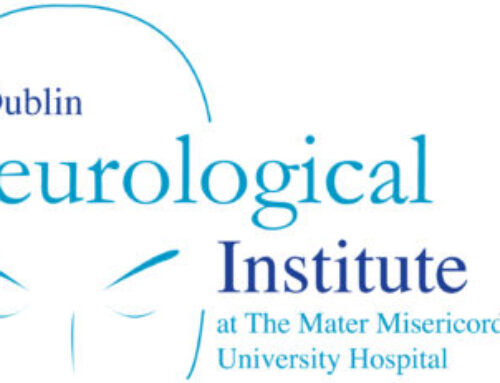Gareth O’Callaghan is an Irish author as well as a former radio and television presenter.
Gareth retired from radio in August 2018 after being diagnosed with the neurodegenerative illness multiple system atrophy (MSA) a rare, progressive and incurable disease (less than 3,500 people are at this time thought to be enduring the condition in the whole of Ireland and the UK), Gareth is under the care of Prof. Tim Lynch (Clinical Director & Consultant Neurologist) and the staff at the Dublin Neurological Institute and he recently posted a powerful and thought provoking article on his Facebook page about his experiences and the quality of care he receives from Professor Lynch and the team. We reproduce the post here to aid understanding of the important and critical work that the Institute carries out from a patient’s perspective. Here are Gareth’s words:
I made a couple of important decisions over the last few weeks. One was to avoid negative people at all costs; and the other was to laugh more. A lot more. I never really gave a lot of thought before to the importance of laughter and its many benefits until I received some unfortunate news earlier this year.
The late American writer Erma Bombeck said shortly before she died, “If I could live my life over again, I would have laughed a lot more”. Bombeck was one of America’s funniest columnists, but yet she felt she had never given herself enough time to enjoy her own loud laughter.
I spent much of yesterday morning chatting with my neurologist, Professor Tim Lynch, at the Dublin Neurological Institute at the Mater Hospital. I was back in with him for a check-up following my diagnosis last June.
Professor Lynch and his amazing team set up the Institute some years back in an effort to reach out and support people who have been diagnosed with neurological conditions, such as Parkinsons, Multiple Sclerosis, Motor Neuron Disease, and so many more (including MSA which I was recently diagnosed with).
It’s a beautiful old-style Victorian building, imaginatively renovated and skillfully organised for the needs and requirements of patients who are affected by the many awful symptoms of these horrible life-changing diseases.
A large group of us sat patiently in the bright spacious waiting room to see our consultants while Pauline played some gorgeous soothing music on a grand piano in the corner of the room as a friendly distraction to what was on the minds of all those there. Each patient smiled and chatted with their carer: each couple united in love, connection and, what appeared to be a resolute determination to fight on through the barricades of their illnesses.
The Institute is funded mostly by fund-raising events, donations and kind benefactors. Without it many thousands of patients with these awful diseases wouldn’t receive adequate care and support for their conditions.
Approximately 44,000 people across Ireland are diagnosed with a neurological condition every year. That’s in addition to the 700,000 people already diagnosed.
Paula and I agreed that the overall feeling in the room was one of gratitude. There was also a lot of smiling and laughter, which everyone appreciated. There’s not much to laugh about when you’re uncertain about what lies ahead, but laughter dilutes the uncertainties of life. It brings us back to the present moment, and blocks out the tendency to worry about those things we often have no control over.
There are very few certainties in life. Most of those we know of are not pleasant. However, laughter carries one certainty: it will make you feel better about yourself, no matter what might be your circumstances. It might be a fleeting escape, but at least we know that laughter is always on standby to help us lift the weary spirit.
My meeting with Prof Lynch was fruitful, fascinating, and filled with all sorts of possibilities and reasons to remain strong and optimistic. Even at the heart of the most serious of conversations we all took time to joke and laugh heartily about this weird time and space we each find ourselves in called Life.
A life without laughter is a recipe for disaster; while a life that includes lots of unexpected moments of laughter that leaves you wiping your wet eyes is a life richly lived and enjoyed – no matter what your ailment might be.
Despite the seriousness of the diagnosis, and the incredible weight of responsibility and duty to care for his patients that this wonderful man carries on his shoulders, and the huge decisions he must make everyday, he was also able to make us laugh out loud yesterday.
My abiding memory is of a morning well spent in good company enriched by moments of laughter. Quite possibly that’s the main reason I left the Institute feeling lighter and better and healthier than I had felt before going in.





